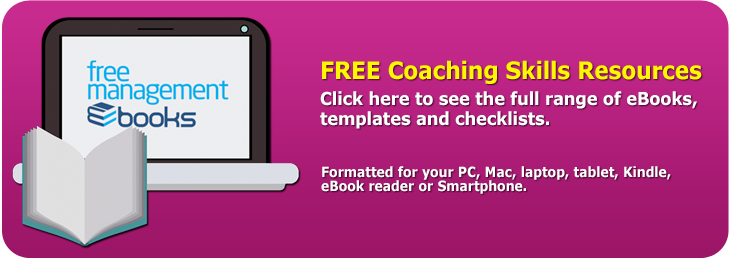Building Rapport with the Coachee
The word 'rapport' describes the amount of warmth present in a conversation, and is affected by how connected the participants feel. If you have good rapport with someone, you will feel comfortable and relaxed in each other's company to the extent that you can talk frankly and openly with neither side feeling defensive.
In the coaching relationship, the focus should be on the coachee's professional goals and how they can be achieved. Coaching is not counseling so it does not require the coach to know too much about the coachee's private life or to become their 'best friend.' Your aim as coach is to create a level of rapport that means the coachee is happy to talk honestly about their work performance.
 |
Your key to building genuine rapport with your coachee is to draw upon other experiences in your life where it has come naturally. If you're like most people, when you welcome guests into your home you are typically glad to see them, and you want to make them feel welcome and at ease. While the specifics of what you might say to a team member are different from what you might say to a houseguest, the motivation and attitude behind the words should be the same.
In the coaching meetings, after an initial greeting, open the conversation with a remark that lets the coachee know that you are genuinely interested in them and what they have to say. Then follow this with a question that leads the conversation into the aim of the coaching. Remember to actively listen and display your interest in what the coachee is saying, and avoid doing too much of the talking.
Where you already have a good and open working relationship in place, you don't need to do anything specifically to build rapport since it already exists. However, if you don't really know the coachee, then you will need to build a foundation for the coaching relationship. You need to allow sufficient time for the coaching process and this aspect should not be hurried.
Any attempt to rush it carries the danger of being seen as artificial, something you need to avoid at all costs. This is also true of the often-cited advice from coaching trainers that you should mirror your coachee's body language and speech patterns. If you are not skilled in this activity it can come across as false and potentially annoying, which will be detrimental to why you are conducting the coaching, especially if you work together.
It is also a risky strategy to begin the coaching meeting by talking about the coachee's personal interests. Unless you are absolutely sure of your ground, talking to someone about a topic you have only a passing interest in or about which you know very little usually comes across as artificial and false.
If you do decide that this is appropriate then you must be sure that they really are interested in the subject. Do you have solid evidence that it is an ongoing interest rather than something that they only did once? Is it something that you know enough about or are sufficiently interested in to engage in a meaningful conversation about? If you look blank, confused, or bored when they begin talking about a topic they care about then this will be counterproductive.
The safest course of action is to talk about something that is work-related and about which you believe they have a genuine interest in or at least an opinion about. Don't make the mistake of asking them about something they are directly involved in, because this may trigger defensive behavior. The sort of topics you could talk about are:
• The strategic goals of the organization,
• The activities of a competitor, a customer, or a supplier etc.
The aim is to keep the resulting conversation work-based, 'real,' and non-intrusive. Once you get to know the coachee better you can begin to talk about things outside of work, but only if it feels natural to do so and helps you in facilitating the coachee's thinking.
Another reason for keeping the initial conversation work-based is that it leads naturally into taking about their work-based goals, whereas moving from a non-work topic to a work-based one can be awkward, particularly if the non-work-based conversation is going well.
Finally, don't try to build rapport for the sake of doing so. When the coachee appears comfortable with the conversation, and is relaxed and confident enough to put forward their ideas and thoughts you have created the right level of rapport for coaching to be successful.
You may also be interested in:
Management Coaching Skills and Models | Coaching and Active Listening | Asking Questions in a Coaching Session | Coaching and Goal-setting | Giving Feedback to the Coachee | Demonstrating Empathy and Using Intuition in Coaching | Coaching Models and 'The Inner Game' | The GROW Coaching Model | The TGROW Coaching Model | The OSKAR Coaching Model | Organizational Barriers to Coaching.



